Lesson 1 Ping-pong and Basketball 课件(36张PPT,内嵌音频)
文档属性
| 名称 | Lesson 1 Ping-pong and Basketball 课件(36张PPT,内嵌音频) |
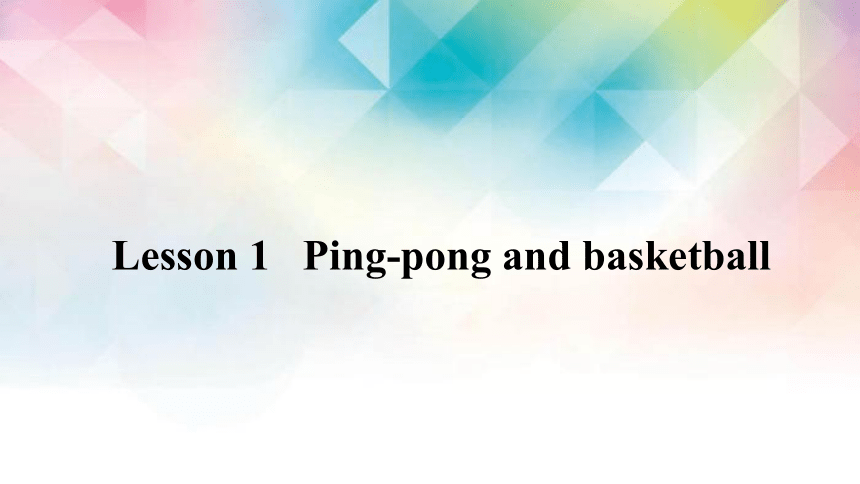
|
|
| 格式 | ppt | ||
| 文件大小 | 5.3MB | ||
| 资源类型 | 教案 | ||
| 版本资源 | 冀教版(三年级起点) | ||
| 科目 | 英语 | ||
| 更新时间 | 2020-06-12 11:34:32 | ||
图片预览

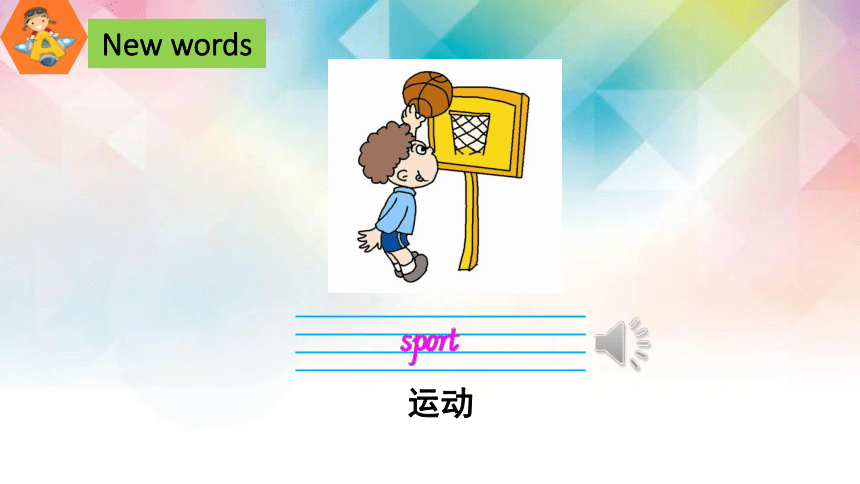
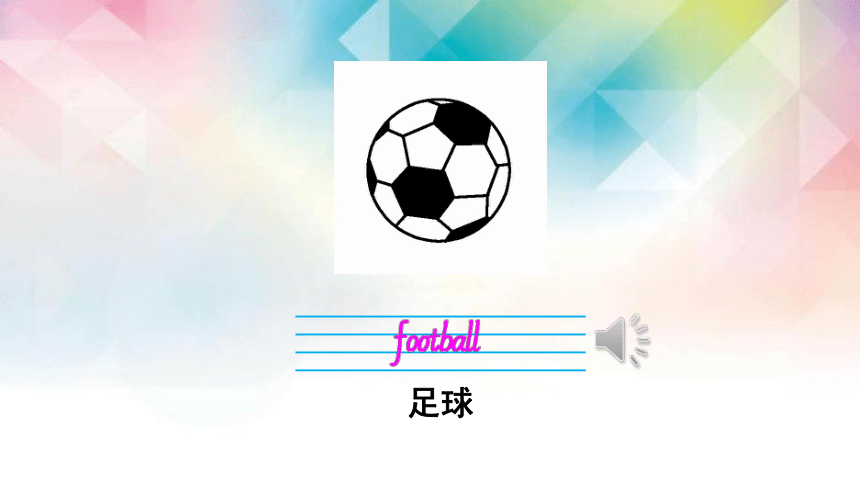
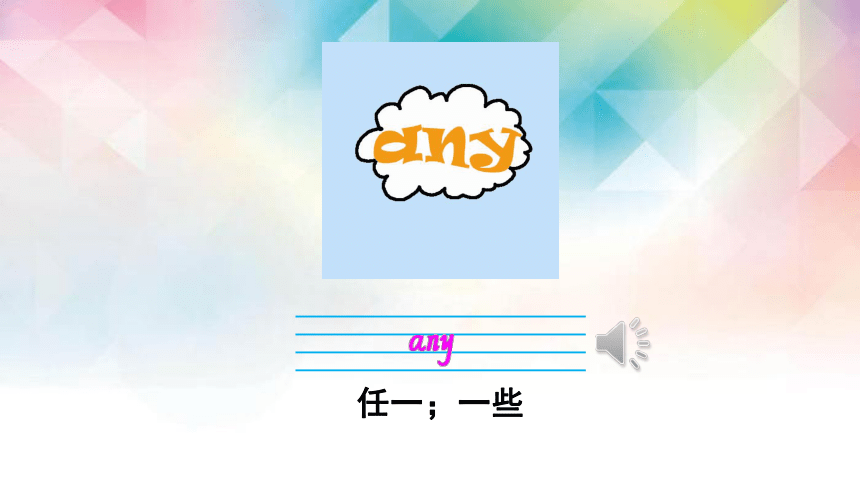
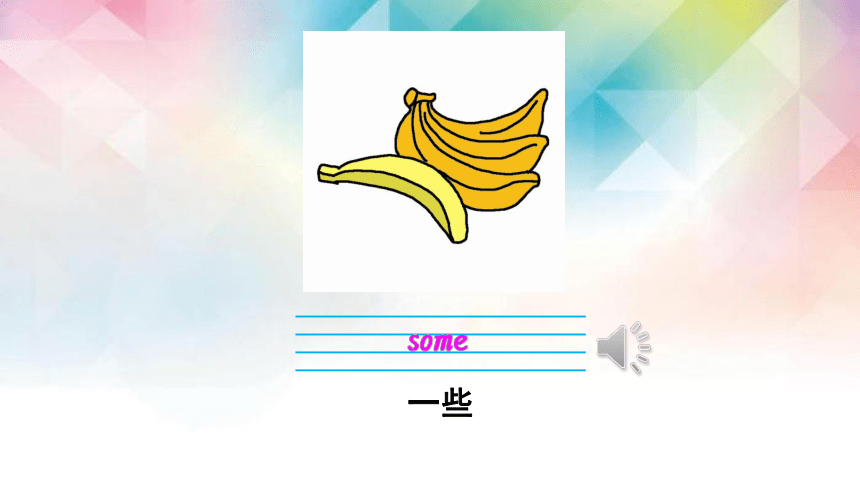
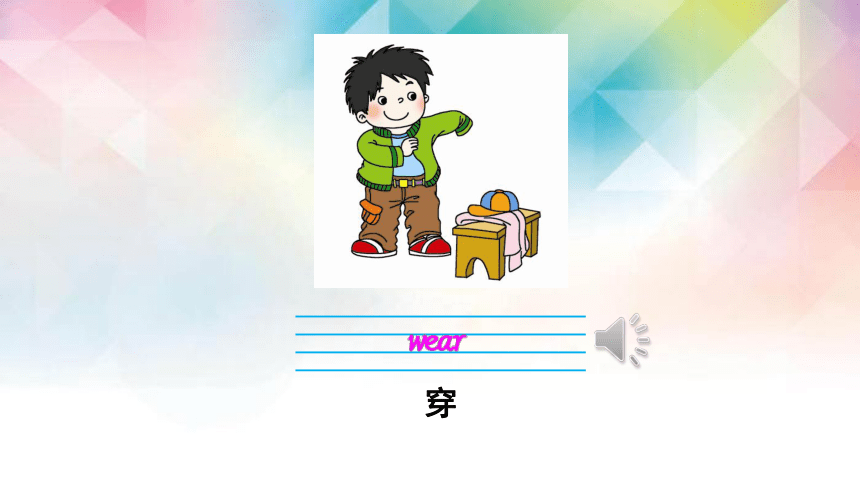
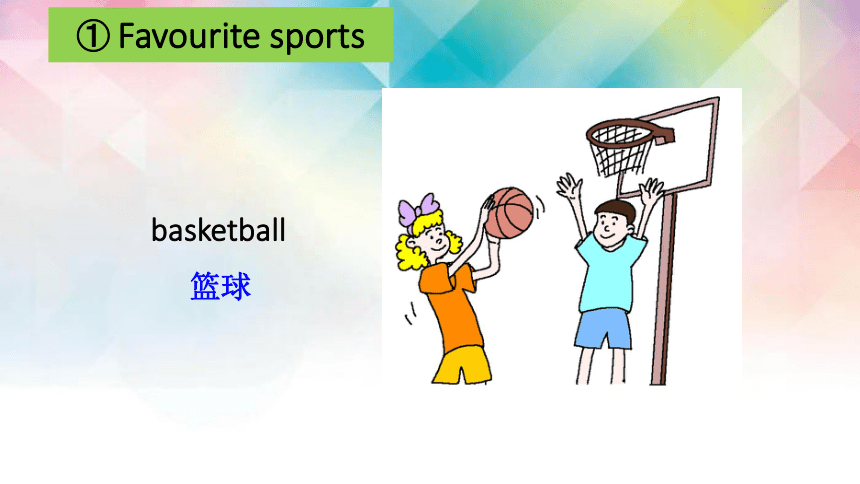
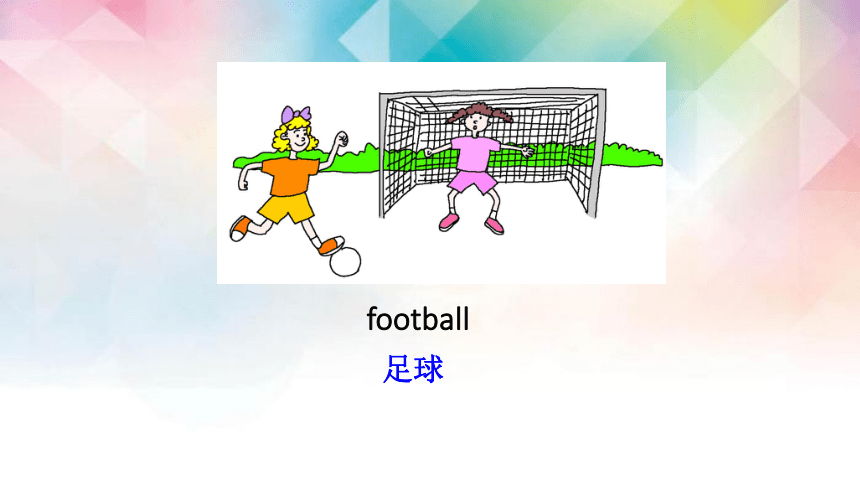
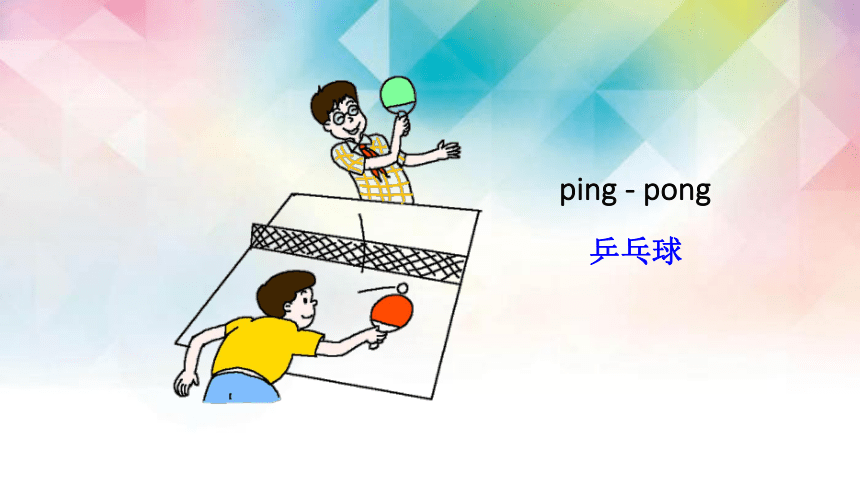
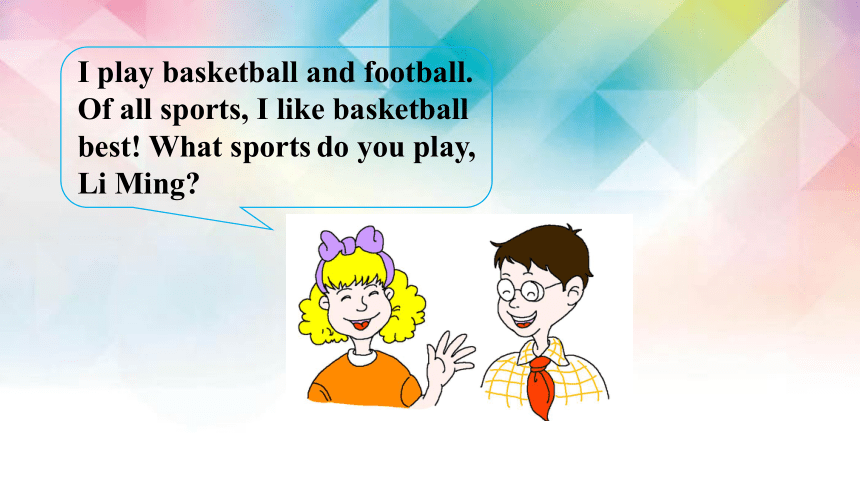
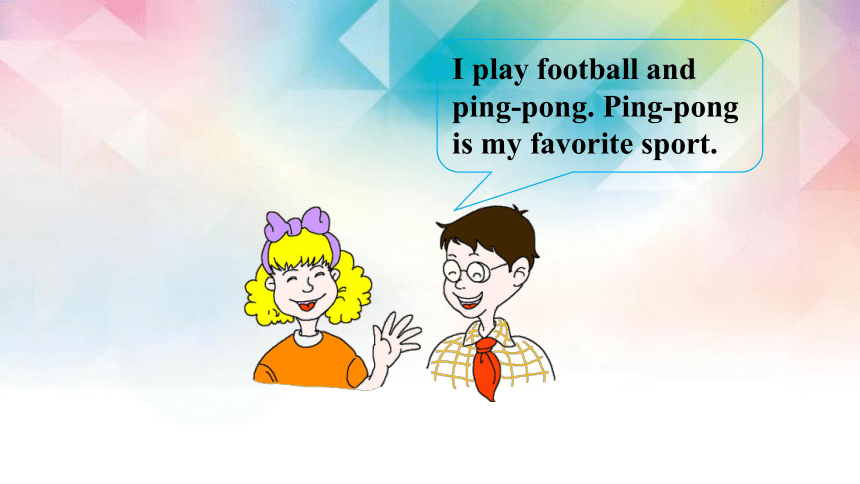
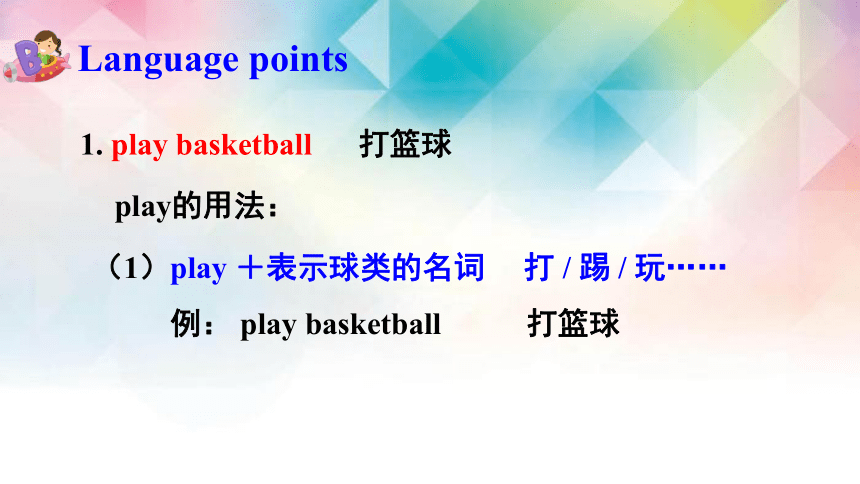
文档简介
Lesson 1 Ping-pong and basketball
New words
运动
足球
任一;一些
一些
穿
basketball
篮球
① Favourite sports
football
足球
ping - pong
乒乓球
I play basketball and football. Of all sports, I like basketball best! What sports do you play, Li Ming?
I play football and ping-pong. Ping-pong is my favorite sport.
Language points
1. play basketball 打篮球
play的用法:
(1)play +表示球类的名词 打 / 踢 / 玩……
例: play basketball 打篮球
(2)play +the +表示乐器的名词 弹 / 奏 / 拉……
例: play the piano 弹钢琴
(3)play games 玩游戏
但是如果表示特指某一项游戏时,要与the连用。
2. Of all sports, I like basketball best!
在所有运动中,我最喜欢篮球。
of all + 可数名词复数 在所有的……之中
表示范围,通常与最高级连用。
例:在所有学生中,他最高。
He is the tallest of all the students.
3. What sports do you play, Li Ming?
你做什么运动,李明?
sport是可数名词,其复数形式为sports。
常用短语:play sports
have sports
do sports
做运动
4. Ping-Pong is my favourite sport.
乒乓球是我最喜欢的运动。
favorite 最喜欢的,相当于 like…best.
常用句型:one’s favorite…is…
=sb like (likes) best.
例:我最喜欢西红柿。
My favorite food is tomatoes./ I like tomatoes best.
②Do you have any ping-pong balls?
Can you teach me to play ping-pong?
Sure!
Let’s go to play ping-pong and basketball tomorrow.
Great! I can learn to play basketball.
Do you have any ping-pong balls?
No. We can buy some.
I also need a T-shirt. I always wear a T-shirt to play ping-pong.
Okay. Let’s go shopping.
Language points
1. Can you teach me to play Ping-Pong?
你能教我打乒乓球吗?
teach sb to do sth. 教某人来做某事
例:詹妮经常教我打篮球。
Jenny often teaches me to play basketball.
2. I can learn to play basketball. 我可以学打篮球。
learn 学习
learner 学习者
learn to do sth. 学习做某事
例:我学习做风筝。
I learn to make a kite.
3. Do you have any ping-pong balls?
你有乒乓球吗?
(1)Do you have any…? 询问对方是否有……
肯定答语:Yes, I/we do.
否定答语:No, I/we don’t.
(2)any 在文中作限定词,意思是“一个,一些”。
它多用于否定句和疑问句中。
后接可数名词复数或不可数名词。
例:你在这里有一些朋友吗?
Do you have any friends here?
4. We can buy some.我们可以买一些。
some 一些
some 既可以修饰可数名词复数,又可以修饰不可数名词,多用于肯定句中,但也可用于表示希望得到肯定回答的一般疑问句中。
例:你想要一些苹果吗?
Would you like some apples?
5. I always wear a T-shirt to play ping-pong .
我总是穿T恤打乒乓球。
wear 穿着,戴着
表示穿戴的状态,其对象是衣物、鞋帽、手表等。
例:露西戴着一副眼镜。
Lucy wears a pair of glasses.
(1)put on 穿上,戴上
强调穿和戴的动作。
拓展:
例:他穿上外套出去了。
He puts on his coat and goes out.
(2)dress 给……穿衣服
表穿的动作时,后面用人做宾语。
dress oneself 穿着;打扮
例:她现在能自己穿衣服了。
She can dress herself now.
6. Let’s go shopping. 咱们去买东西吧。
Let’s do 让我们做……吧
这是一个祈使句,通常用于提建议时。
Let’s = let us
例:咱们一起唱首歌吧!
Let’s sing a song!
③ Let’s do it!
1. Look and talk.
I like sports. Basketball is my favorite. I always wear a T-shirt to play basketball. What about you?
I play…
I like sports. Basketball is my favorite. I always wear a T-shirt to play basketball. What about you?
I play ping-pong and I always wear a pair of sports shoes.
What do you like?
I like sports. Football is my favourite. I always wear shorts and a T-shirt.
2. Read and write.
a. Kim is hungry. She would like ________ bananas.
b. I’m thirsty. Do you have ________ water ?
c. She has ________ apples.
some any
some
any
some
d. —Do you have ________ pencils?
—No. We can buy ________.
e. They have ________ bread and ________ eggs for
breakfast, but they don’t have ________ milk.
any
some
some
some
any
New words
运动
足球
任一;一些
一些
穿
basketball
篮球
① Favourite sports
football
足球
ping - pong
乒乓球
I play basketball and football. Of all sports, I like basketball best! What sports do you play, Li Ming?
I play football and ping-pong. Ping-pong is my favorite sport.
Language points
1. play basketball 打篮球
play的用法:
(1)play +表示球类的名词 打 / 踢 / 玩……
例: play basketball 打篮球
(2)play +the +表示乐器的名词 弹 / 奏 / 拉……
例: play the piano 弹钢琴
(3)play games 玩游戏
但是如果表示特指某一项游戏时,要与the连用。
2. Of all sports, I like basketball best!
在所有运动中,我最喜欢篮球。
of all + 可数名词复数 在所有的……之中
表示范围,通常与最高级连用。
例:在所有学生中,他最高。
He is the tallest of all the students.
3. What sports do you play, Li Ming?
你做什么运动,李明?
sport是可数名词,其复数形式为sports。
常用短语:play sports
have sports
do sports
做运动
4. Ping-Pong is my favourite sport.
乒乓球是我最喜欢的运动。
favorite 最喜欢的,相当于 like…best.
常用句型:one’s favorite…is…
=sb like (likes) best.
例:我最喜欢西红柿。
My favorite food is tomatoes./ I like tomatoes best.
②Do you have any ping-pong balls?
Can you teach me to play ping-pong?
Sure!
Let’s go to play ping-pong and basketball tomorrow.
Great! I can learn to play basketball.
Do you have any ping-pong balls?
No. We can buy some.
I also need a T-shirt. I always wear a T-shirt to play ping-pong.
Okay. Let’s go shopping.
Language points
1. Can you teach me to play Ping-Pong?
你能教我打乒乓球吗?
teach sb to do sth. 教某人来做某事
例:詹妮经常教我打篮球。
Jenny often teaches me to play basketball.
2. I can learn to play basketball. 我可以学打篮球。
learn 学习
learner 学习者
learn to do sth. 学习做某事
例:我学习做风筝。
I learn to make a kite.
3. Do you have any ping-pong balls?
你有乒乓球吗?
(1)Do you have any…? 询问对方是否有……
肯定答语:Yes, I/we do.
否定答语:No, I/we don’t.
(2)any 在文中作限定词,意思是“一个,一些”。
它多用于否定句和疑问句中。
后接可数名词复数或不可数名词。
例:你在这里有一些朋友吗?
Do you have any friends here?
4. We can buy some.我们可以买一些。
some 一些
some 既可以修饰可数名词复数,又可以修饰不可数名词,多用于肯定句中,但也可用于表示希望得到肯定回答的一般疑问句中。
例:你想要一些苹果吗?
Would you like some apples?
5. I always wear a T-shirt to play ping-pong .
我总是穿T恤打乒乓球。
wear 穿着,戴着
表示穿戴的状态,其对象是衣物、鞋帽、手表等。
例:露西戴着一副眼镜。
Lucy wears a pair of glasses.
(1)put on 穿上,戴上
强调穿和戴的动作。
拓展:
例:他穿上外套出去了。
He puts on his coat and goes out.
(2)dress 给……穿衣服
表穿的动作时,后面用人做宾语。
dress oneself 穿着;打扮
例:她现在能自己穿衣服了。
She can dress herself now.
6. Let’s go shopping. 咱们去买东西吧。
Let’s do 让我们做……吧
这是一个祈使句,通常用于提建议时。
Let’s = let us
例:咱们一起唱首歌吧!
Let’s sing a song!
③ Let’s do it!
1. Look and talk.
I like sports. Basketball is my favorite. I always wear a T-shirt to play basketball. What about you?
I play…
I like sports. Basketball is my favorite. I always wear a T-shirt to play basketball. What about you?
I play ping-pong and I always wear a pair of sports shoes.
What do you like?
I like sports. Football is my favourite. I always wear shorts and a T-shirt.
2. Read and write.
a. Kim is hungry. She would like ________ bananas.
b. I’m thirsty. Do you have ________ water ?
c. She has ________ apples.
some any
some
any
some
d. —Do you have ________ pencils?
—No. We can buy ________.
e. They have ________ bread and ________ eggs for
breakfast, but they don’t have ________ milk.
any
some
some
some
any
同课章节目录
- Unit 1 Sports
- Lesson 1 Ping-pong and basketball
- Lesson 2 At the sports Shop
- Lesson 3 Let's Play!
- Lesson 4 Did You Have Fun?
- Lesson 5 A Basketball Game
- Lesson 6 A Famous Football Playe
- Again, please!
- Unit 2 Good Health to You!
- Lesson 7 Always Have breakfast!
- Lesson 8 Always Brush Your Teeth!
- Lesson 9 Eat More Vegetables and Fruit!
- Lesson 10 Exercise
- Lesson 11 Work hard!
- Lesson 12 Helen Kelle
- Again, please!
- Unit 3 What Will You Do This Summer?
- Lesson 13 Summer is coming!
- Lesson 14 Tomorrow We Will Play
- Lesson 15 Jenny's Summer Holiday
- Lesson 16 Li Ming's Summer Holiday
- Lesson 17 Danny's Summer Holiday
- Lesson 18 Three Kites in the Sky
- Again, please!
- Unit 4 Li Ming Comes Home
- Lesson 19 Buying Gifts
- Lesson 20 Looking at Photos
- Lesson 21 A party for Li Ming
- Lesson 22 Surprise!
- Lesson 23 Good-bye!
- Lesson 24 Danny's Surprise Cake
- Again, please!
